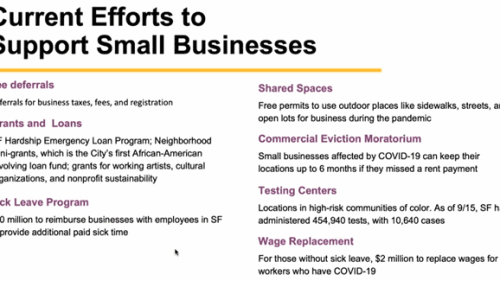Deals are still going through despite a global economic slowdown, but the coronavirus outbreak may affect real estate for years to come.
As the coronavirus pandemic continues to play out, the real estate industry is already considering what the long-term effects could be. With their short-term plans focusing on the health and safety of employees and tenants, forward-thinking developers and investors are looking at medium- and long-term horizons as well.
ULI Europe gathered experts for an online panel discussion titled “Confronting the Pandemic: Perspectives from Global Real Estate Leaders” on April 8. The recorded webinar can be viewed through ULI Knowledge Finder. This recording is open to all.
Thoughindividual regions are starting to emerge from the pandemic, it still is notbusiness as usual.
“Asiais not out of the woods at all, but China is coming back to work, and factoriesare gradually opening,” said Christina Gaw, managing principal and head of capitalmarkets at GAW Capital Partners in Hong Kong. Wuhan was just starting to emergefrom the lockdown that Chinese officials instituted in late January.
Webinarspeakers noted that online purchases rose dramatically during the pandemic whereasin-person payments dropped. But payment processors in China were reporting thatoffline transactions had returned to about 70 percent of pre-pandemic levels,she said, a good sign for normalcy.
Someoffices are empty while lockdowns remain in place, but many industrial sitescontinued to operate. Construction was shut down in some regions, but not all, notedLars Huber, chief executive officer of Hines’sEuropean region in London.
Nathalie Palladitcheff, president and chief executiveofficer at global real estate firm Ivanhoé Cambridge in Montreal, offered theview from Canada. As of early April, the country had been protected from anoutbreak on the scale of that in the United States. But each province isissuing individual guidelines: shopping centers were still open in some partsof Canada.
“We’retrying to be a good citizen and help small businesses with liquidity problems,deferring some rents to provide some flexibility to local tenants,” she said.
Retailand gastronomy tenants are struggling in many areas, but grocery storesand convenience stores that were allowed to remain open were thriving. Hubernoted that the coronavirus pandemic will likely have a big effect on thelong-term viability of bricks-and-mortar retail.
Van J. Stults, foundingpartner at Orion Capital Managers in London, said he was seeing rent nonpaymentrates of 70 to 80 percent for retail in the second quarter, while other sectorswere seeing rates closer to 50 percent. His firm decided to deal with tenants ona case-by-case basis to determine which ones would have been in trouble even withoutthe crisis.
Government bailout plans around the world havefocused primarily on tenants, putting landlords in a sticky place betweentenants and banks, participants noted.
Singapore is one of the many countries blocking evictions during the coronavirus pandemic, but Gaw said that across her company’s portfolio perhaps 20 percent of retail tenants were asking for deferrals.
“We’re working with banks to come up with better payment packages alongside tenants’ requests,” she said. “We have good credibility with the banks so we’re getting good support from them, especially for the Asia Pacific region.”
Stults said he had been surprised by the range ofresponses from banks. “Generally, on the continent—in Spain, Italy, and Germany—they’vebeen supportive. But in the U.K., it’s a mixed response,” he said.
Huber estimated that about 80 percent of banks werenot looking for new deals, but 20 percent of banks were. “The big question iswhen the second-quarter valuations come in,” he said. “It’s a moving target,and we’re just at the beginning of that conversation.”
Palladitcheffagreed that many questions remain, with big gaps between valuations in NorthAmerica and Europe. Stults said he does not think valuations are the correctfocus for operators or for lenders now.
“Managingthrough the pandemic is not about determining value,” Stults said. “Dealingwith stakeholders is important. You manage the operations, and the value is an outcome.”
Gaw said that according to her conversations withinvestors, interest in good opportunities persists—especially in data centers—buteveryone understands that the process will be slower than usual. She said she isnot seeing any panic selling or distress in the Asian market.
Deals still going forward are likely to be advancedresidential and logistics projects, Huber said. “We’re also seeing good-qualityland deals going through, especiallythose with longer zoning and planning periods, where construction starts are maybetwo years out,” he said.
Despite the global slowdown, “good deals are still getting done if theywere in the pipeline,” Palladitcheff said. “Some deals make even more sensethan they did, depending on the sector and geography.”
Density in offices, coworking spaces, hospitals, andtransit will have to be reconsidered in a post-coronavirus world, panelistssaid. “Buildings might become obsolete more quickly if they don’t meetguidelines,” Stults predicted.
Though the experts estimated that the next threequarters will be critical for recovery, the coronavirus pandemic is likely tochange how buildings and public spaces are designed for years to come.
Learn more about ULI Europe’s upcoming webinars here, and access recorded webinars on demand at ULI Knowledge Finder.



